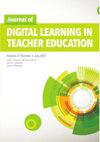Course design features influencing preservice teachers’ self-efficacy beliefs in their ability to support students’ use of ICT
Q1 Social Sciences
Journal of Digital Learning in Teacher Education
Pub Date : 2020-07-06
DOI:10.1080/21532974.2020.1781000
引用次数: 5
Abstract
Abstract This study explores how using action plans, SMART goals, personal learning networking and peer teaching in a first-year education technology course influence pre-service teachers’ (PSTs’) self-efficacy beliefs in their technological pedagogical knowledge (TPK) and technological content knowledge (TCK). Pre- and post-course survey items from the Teaching Teachers for the Future project were administered to examine PSTs’ judgements of their self-efficacy to support students’ use ICT in the classroom, including digital and robotics technologies. Results showed a significant increase in PSTs’ confidence in using ICT in the classroom with the strongest effect-size for supporting students’ use of robotics and digital technologies (r > 0.5). Course design features are discussed with reference to the corresponding impact on PST self-efficacy with recommendations for improvements to practice.课程设计特征影响职前教师在支持学生使用信息通信技术方面的自我效能信念
摘要本研究探讨了在一年级教育技术课程中使用行动计划、SMART目标、个人学习网络和同伴教学如何影响职前教师对其技术教学知识(TPK)和技术内容知识(TCK)的自我效能信念。管理“未来教师教学”项目的课前和课后调查项目,以检查PST对其自我效能的判断,以支持学生在课堂上使用ICT,包括数字和机器人技术。结果显示,PST在课堂上使用ICT的信心显著增强,对支持学生使用机器人和数字技术的影响最大(r > 0.5)。课程设计特征参照对PST自我效能感的相应影响进行了讨论,并提出了改进实践的建议。
本文章由计算机程序翻译,如有差异,请以英文原文为准。
求助全文
约1分钟内获得全文
求助全文
来源期刊

Journal of Digital Learning in Teacher Education
Social Sciences-Education
CiteScore
4.90
自引率
0.00%
发文量
15
 求助内容:
求助内容: 应助结果提醒方式:
应助结果提醒方式:


